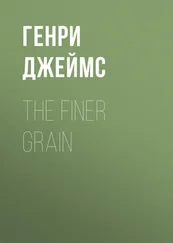Генри Джеймс - In the Cage
Здесь есть возможность читать онлайн «Генри Джеймс - In the Cage» — ознакомительный отрывок электронной книги совершенно бесплатно, а после прочтения отрывка купить полную версию. В некоторых случаях можно слушать аудио, скачать через торрент в формате fb2 и присутствует краткое содержание. Жанр: foreign_prose, foreign_antique, на английском языке. Описание произведения, (предисловие) а так же отзывы посетителей доступны на портале библиотеки ЛибКат.
- Название:In the Cage
- Автор:
- Жанр:
- Год:неизвестен
- ISBN:нет данных
- Рейтинг книги:3 / 5. Голосов: 1
-
Избранное:Добавить в избранное
- Отзывы:
-
Ваша оценка:
- 60
- 1
- 2
- 3
- 4
- 5
In the Cage: краткое содержание, описание и аннотация
Предлагаем к чтению аннотацию, описание, краткое содержание или предисловие (зависит от того, что написал сам автор книги «In the Cage»). Если вы не нашли необходимую информацию о книге — напишите в комментариях, мы постараемся отыскать её.
In the Cage — читать онлайн ознакомительный отрывок
Ниже представлен текст книги, разбитый по страницам. Система сохранения места последней прочитанной страницы, позволяет с удобством читать онлайн бесплатно книгу «In the Cage», без необходимости каждый раз заново искать на чём Вы остановились. Поставьте закладку, и сможете в любой момент перейти на страницу, на которой закончили чтение.
Интервал:
Закладка:
Henry James
In the Cage
CHAPTER I
It had occurred to her early that in her position—that of a young person spending, in framed and wired confinement, the life of a guinea-pig or a magpie—she should know a great many persons without their recognising the acquaintance. That made it an emotion the more lively—though singularly rare and always, even then, with opportunity still very much smothered—to see any one come in whom she knew outside, as she called it, any one who could add anything to the meanness of her function. Her function was to sit there with two young men—the other telegraphist and the counter-clerk; to mind the “sounder,” which was always going, to dole out stamps and postal-orders, weigh letters, answer stupid questions, give difficult change and, more than anything else, count words as numberless as the sands of the sea, the words of the telegrams thrust, from morning to night, through the gap left in the high lattice, across the encumbered shelf that her forearm ached with rubbing. This transparent screen fenced out or fenced in, according to the side of the narrow counter on which the human lot was cast, the duskiest corner of a shop pervaded not a little, in winter, by the poison of perpetual gas, and at all times by the presence of hams, cheese, dried fish, soap, varnish, paraffin and other solids and fluids that she came to know perfectly by their smells without consenting to know them by their names.
The barrier that divided the little post-and-telegraph-office from the grocery was a frail structure of wood and wire; but the social, the professional separation was a gulf that fortune, by a stroke quite remarkable, had spared her the necessity of contributing at all publicly to bridge. When Mr. Cocker’s young men stepped over from behind the other counter to change a five-pound note—and Mr. Cocker’s situation, with the cream of the “Court Guide” and the dearest furnished apartments, Simpkin’s, Ladle’s, Thrupp’s, just round the corner, was so select that his place was quite pervaded by the crisp rustle of these emblems—she pushed out the sovereigns as if the applicant were no more to her than one of the momentary, the practically featureless, appearances in the great procession; and this perhaps all the more from the very fact of the connexion (only recognised outside indeed) to which she had lent herself with ridiculous inconsequence. She recognised the others the less because she had at last so unreservedly, so irredeemably, recognised Mr. Mudge. However that might be, she was a little ashamed of having to admit to herself that Mr. Mudge’s removal to a higher sphere—to a more commanding position, that is, though to a much lower neighbourhood—would have been described still better as a luxury than as the mere simplification, the corrected awkwardness, that she contented herself with calling it. He had at any rate ceased to be all day long in her eyes, and this left something a little fresh for them to rest on of a Sunday. During the three months of his happy survival at Cocker’s after her consent to their engagement she had often asked herself what it was marriage would be able to add to a familiarity that seemed already to have scraped the platter so clean. Opposite there, behind the counter of which his superior stature, his whiter apron, his more clustering curls and more present, too present, h ’s had been for a couple of years the principal ornament, he had moved to and fro before her as on the small sanded floor of their contracted future. She was conscious now of the improvement of not having to take her present and her future at once. They were about as much as she could manage when taken separate.
She had, none the less, to give her mind steadily to what Mr. Mudge had again written her about, the idea of her applying for a transfer to an office quite similar—she couldn’t yet hope for a place in a bigger—under the very roof where he was foreman, so that, dangled before her every minute of the day, he should see her, as he called it, “hourly,” and in a part, the far N.W. district, where, with her mother, she would save on their two rooms alone nearly three shillings. It would be far from dazzling to exchange Mayfair for Chalk Farm, and it wore upon her much that he could never drop a subject; still, it didn’t wear as things had worn, the worries of the early times of their great misery, her own, her mother’s and her elder sister’s—the last of whom had succumbed to all but absolute want when, as conscious and incredulous ladies, suddenly bereft, betrayed, overwhelmed, they had slipped faster and faster down the steep slope at the bottom of which she alone had rebounded. Her mother had never rebounded any more at the bottom than on the way; had only rumbled and grumbled down and down, making, in respect of caps, topics and “habits,” no effort whatever—which simply meant smelling much of the time of whiskey.
CHAPTER II
It was always rather quiet at Cocker’s while the contingent from Ladle’s and Thrupp’s and all the other great places were at luncheon, or, as the young men used vulgarly to say, while the animals were feeding. She had forty minutes in advance of this to go home for her own dinner; and when she came back and one of the young men took his turn there was often half an hour during which she could pull out a bit of work or a book—a book from the place where she borrowed novels, very greasy, in fine print and all about fine folks, at a ha’penny a day. This sacred pause was one of the numerous ways in which the establishment kept its finger on the pulse of fashion and fell into the rhythm of the larger life. It had something to do, one day, with the particular flare of importance of an arriving customer, a lady whose meals were apparently irregular, yet whom she was destined, she afterwards found, not to forget. The girl was blasée; nothing could belong more, as she perfectly knew, to the intense publicity of her profession; but she had a whimsical mind and wonderful nerves; she was subject, in short, to sudden flickers of antipathy and sympathy, red gleams in the grey, fitful needs to notice and to “care,” odd caprices of curiosity. She had a friend who had invented a new career for women—that of being in and out of people’s houses to look after the flowers. Mrs. Jordan had a manner of her own of sounding this allusion; “the flowers,” on her lips, were, in fantastic places, in happy homes, as usual as the coals or the daily papers. She took charge of them, at any rate, in all the rooms, at so much a month, and people were quickly finding out what it was to make over this strange burden of the pampered to the widow of a clergyman. The widow, on her side, dilating on the initiations thus opened up to her, had been splendid to her young friend, over the way she was made free of the greatest houses—the way, especially when she did the dinner-tables, set out so often for twenty, she felt that a single step more would transform her whole social position. On its being asked of her then if she circulated only in a sort of tropical solitude, with the upper servants for picturesque natives, and on her having to assent to this glance at her limitations, she had found a reply to the girl’s invidious question. “You’ve no imagination, my dear!”—that was because a door more than half open to the higher life couldn’t be called anything but a thin partition. Mrs. Jordan’s imagination quite did away with the thickness.
Our young lady had not taken up the charge, had dealt with it good-humouredly, just because she knew so well what to think of it. It was at once one of her most cherished complaints and most secret supports that people didn’t understand her, and it was accordingly a matter of indifference to her that Mrs. Jordan shouldn’t; even though Mrs. Jordan, handed down from their early twilight of gentility and also the victim of reverses, was the only member of her circle in whom she recognised an equal. She was perfectly aware that her imaginative life was the life in which she spent most of her time; and she would have been ready, had it been at all worth while, to contend that, since her outward occupation didn’t kill it, it must be strong indeed. Combinations of flowers and green-stuff, forsooth! What
Читать дальшеИнтервал:
Закладка:
Похожие книги на «In the Cage»
Представляем Вашему вниманию похожие книги на «In the Cage» списком для выбора. Мы отобрали схожую по названию и смыслу литературу в надежде предоставить читателям больше вариантов отыскать новые, интересные, ещё непрочитанные произведения.
Обсуждение, отзывы о книге «In the Cage» и просто собственные мнения читателей. Оставьте ваши комментарии, напишите, что Вы думаете о произведении, его смысле или главных героях. Укажите что конкретно понравилось, а что нет, и почему Вы так считаете.












